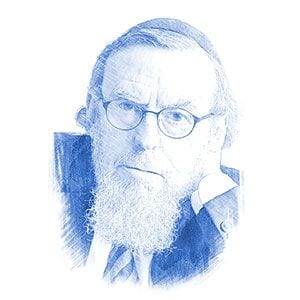I need space to breathe freely. I can’t live in a cage where everything is forbidden and I am surrounded by prohibitions that will take all the joy out of my life and make it unbearable.
So, I can’t be secular.
A few years ago I saw a cat hit by a car. It rolled over several times but escaped unhurt. Its face showed no sign of shock, but its body language indicated clear signs of panic and disorientation. It ran to the side of the road, turned over several times more, as if in total confusion, and then calmed down. I waited a few seconds wondering what I could do to help, but a moment later the cat went on its way and then disappeared.
This unusual and painful sight triggered several thoughts that I have been contemplating for some time since.
How do we know that animals experience less pain than we do? How can we measure this? What is it that makes animals different from human beings and their lives of lesser value?
It has been argued that animals do not possess the sophisticated level of consciousness that humans have. Humans are aware of their very being, of their thinking. They are much more intelligent, far more creative. They can think in abstract terms. Animals are unable to do so, at least not on the same level as humans.
Surely there is an ontological difference between animals and humans. Human beings live life on a level that animals do not share, but we don’t even know what this consists of. We recognize that there is a “jump in a level” from the animal to the human species, but we don’t know what actually constitutes this jump. We merely see the outer aspects of it. Physics and chemistry don’t help; they can only describe it. To claim that they can explain it is like saying that Shakespeare’s Hamlet is nothing but an aspect of a particular combination of letters. But in fact, the particular combination of letters is nothing but an aspect of Shakespeare’s Hamlet. We cannot describe its gestalt. This ultimately remains mysterious. It seems that even the best life sciences can hardly explain life as such. It is simply elusive.
But even when we acknowledge that these differences are real, what criteria determine that the lives of animals are less valuable than those of human beings? How do we know that ontological inferiority also means a lesser claim to the sanctity of life? Who says that less gestalt means less significance and meaning?
What gives us the right to kill animals for our consumption, use them for scientific research, or force them to experience pain for the sake of human beings? Perhaps all forms of life, from the simple to the sophisticated, are of the same “life value” and none of them should have any claim on the other or be subordinate to the other.
What moral criterion, then, do we rely on when we kill animals for food? However careful may we be in sparing them pain while slaughtering, what gives us the right to kill them at all? This challenge does not stop here.
We must also ask what gives us the right to pluck a flower and stop its life flow, or to kill an insect, even if it is dangerous. How do we know that our blood is, as it were, redder than that of the insect? Perhaps human life must be sacrificed for the sake of an insect’s life. The astonishing conclusion is that there are no objective criteria to follow.
Let us take this matter even further. What gives a husband the right to impregnate his wife, knowing she will no doubt undergo serious pain and discomfort when giving birth? Is this entirely dependent on his wife’s consent? Who says we are allowed to put her in the slightest danger even if she has fully agreed? What gives us the right to have sexual relations with a human being but forbids us to do so with another creature? Once again, we lack absolute moral criteria.
It is for this reason that there are serious doubts as to whether “morality” could ever allow any of the above. If there are no absolute criteria by which we determine how to deal with these questions, a consistent approach may well lead us to conclude that the slaughtering of animals, the killing of insects, the plucking of a flower, and the impregnation of women should be strictly forbidden. In case of doubt, the rule should be: Forbidden!
Like it or not, we may be forced to conclude that much of what we assume to be permitted should, in fact, be prohibited. The list of forbidden acts would be nearly infinite.
This brings us to a most amazing conclusion: A strictly secular approach to major moral issues may have to be much more restrictive than that which any religion would ever demand. In fact, a secular moral attitude may make life extremely difficult and even impossible.
I, therefore, declare that I cannot be secular. It’s too difficult. I’d have to live with so many constraints that I would collapse.
It is religion, and not a consistent secular attitude, that has the more liberal approach to moral issues. Religion, in fact, removes many restrictions that would otherwise be imposed by secular standards of morality. In the case of Judaism, Halacha rules that one is allowed to slaughter an animal, albeit under certain circumstances. It allows and even obligates us to kill a dangerous insect. And in the case of a married woman, it makes the radical claim that it is a mitzva for her husband to impregnate her and have children, even though childbirth is excruciatingly painful. It does so purely on the basis of its faith that the Creator not only permitted these acts but even demanded them. This, of course, cannot be proved, but if Halacha would reject these beliefs, it would have no option but to forbid all of the above, as would secular morality.
We may, therefore, have to admit that we have been wrong for hundreds, if not thousands of years. It is not religion that restricts our lives — it is secularism.
True, we may not have seen secularism in this light and may have allowed ourselves many liberties in its name, but we should be aware that this approach may be entirely wrong. It should perhaps be the reverse: secularity makes life very difficult, not religion.
If so, we must argue that in the case of Judaism, the 613 commandments do not restrict us. On the contrary, they liberate us from hundreds, if not thousands of prohibitions that honest secularism would have imposed on us.
Professor E.S. Waterhouse was incorrect when he made the disturbing observation that just as a parasite is an independent organism but dependent on its host for survival, so is secular morality dependent on religious values for its restrictions. I do not agree. The reverse is true: If secularism would stand on its own, it would be so restrictive as to make life extremely difficult, if not impossible. That it permits so much is due to the fact that it has adopted much from the “permissive” world of religion.
And therefore I can’t be secular. It would be hell.
Rather an unusual observation prompted by a simple cat.
Reprinted with author’s permission from Times of Israel





